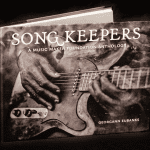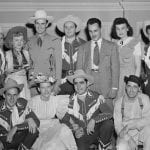Talking with Eric Bibb about the North Country Far and More
Eric Bibb is on the phone and he is animated. He seems to be happy — really happy. It’s a fitting mood to talk about about his latest release, The Happiest Man in the World (out May 6 on Stony Plain Records), which he recorded in the countryside with a group of old friends. At first glance it would be easy to categorize this record as one of Bibb’s most personal statements. But to do so would be to do him a disservice because he cares very deeply for each of the albums he’s crafted. As a true professional, Bibb seeks to maintain a reputation as a troubador with a top notch catalog and few peers. That said, this is one of his most personal statements to date.
On this new collection, themes of marital bliss and a slower, more intentional way of living abound. The band is stellar, augmented by none other than Danny Thompson on bass. Thompson brings his wealth of experience and innate genius to the session and the result is sublime.
Joe McSpadden: How did North Country Far, the group, come about? Did they already exist and you connected with them?
Eric Bibb: It’s a group that I put together when I befriended these wonderful musicians from Finland. Guys I still work with sporadically. We are friends, and we’ll know each other and play together, on and off, for a long time I hope. The two Haavisto brothers, Olli the Dobro player, and Janne the drummer — I met them early on when I first moved to Finland. They introduced me to the mandola player, Petri Hakala. We bill it as Eric Bibb and North Country Far. We did a tour last year in Germany.
So the group was in place, and it was Olli, the Dobro player, who suggested making the record with Danny. He was a big fan of Danny’s and he knew I had worked with Danny in the past, so he suggested we contact him.
I reached out to Danny and to my record company, and I am so glad I did. I was glad for the chance because I don’t know how much more recording he is going to be doing. Who knows? I’m just really glad we got this project done because he’s a dear friend. I’m just honored that I got a chance to do something definitive with him.
So Danny is the guest star?
Exactly. He’s the featured guest.
Danny goes way back. He has such an impressive resume.
I first started hearing him on those old Pentangle records from the ’60s.
The first time I really noticed him was on Ralph McTell’s Easy record, which was ’74, I think. That leads to my next point: You have become, unofficially, a sort of musical ambassador. You don’t describe yourself that way, but when you look at the projects you have done in recent years … you’re connecting points all across the globe.
Yeah, it’s turned out that way, much to my happiness. It hasn’t really been a plan as much as it has been something that has kind of evolved through my travels and my love of certain kinds of music. I have been pretty vocal about my love of West African music. And I seem to have attracted — or magnetized to myself — some really wonderful musicians from that part of the world. I have been able, much to my delight, to record with artists from Mali, artists like Habib Koite. I’ve played with Toumani (Diabate). It has been a really wonderful experience to get to play with those musicians from West Africa, particularly Korah players.
I have a project coming up called 33 Strings. A Korah has 21 strings. Add two guitar players and you end up with 33 strings. It’s a project with a Korah player from Senegal. He and Ollie Haavisto will be touring with me in Germany in December. We will do some recording. It might not be a major label release — maybe something we will have at the merch table.
The new one, with North Country Far … is this an album of traditional songs, or is there some new Eric Bibb material?
New songs. Some of them sound like old songs. There is a version of a song I have loved for many years, and recorded a few times, “Tell Ol’ Bill.” But the rest of the songs are new songs. I felt really happy about having an acoustic band doing new songs that sound like older songs. One of my goals and intentions has been to keep writing. I am sort of rooted and grounded in older song styles and I found it creatively exciting to add to the canon of older material — whether they are blues or country songs, or hokum songs. These genres need new material, and we need to have them coming from contemporary writers.
The great American songbook is not static.
Exactly. The people that we admire — Leadbelly, Hank Williams, Pete Seeger — they were creating new material for the genre that they were working in. Some of it kind of stagnated, I’m thinking particularly of the blues. New songs are needed. [We need] an infusion of new material that can be reminiscent of older material.
I mean, we don’t need blues songs about iPhones. [But] it’s not like we are sharecroppers and can relate to that experience. We can pixelize. We can create new characters in that genre, but basically we need new blood in that area.
Well, certainly if you want any emotional authenticity …
Exactly.
I am no blues singer, but I could not sing about working in the cotton fields with any credibility at all.
Yes, I hear you. Exactly, that’s the point. It’s tricky. It really is tricky because there is so much that we are attached to nostalgically, emotionally, from the older imagery, back when we first heard the music. Back when we heard that music, that’s the language that it used. It imprinted itself on our souls. The reason it imprinted us was that it had authenticity. A new artist has to bring something from their own experience.
They need to bring emotional truth. The things I hear in music that get to me are emotionally true. I get disheartened when I hear a singer sing passionately about toaster waffles. It makes the singing feel like a bag of tricks instead of honest expression. Is it just mechanics? Can you turn it on or off at will?
One of the things I find irritating about popular music — and I am not against popular music; I grew up with great stuff on the AM radio dial, whether it was the Beatles or whether it was Motown, Stax, or whatever — popular music has its ups and downs. I can say that there is always a degree of acting in performing. You have to bring emotion to it. You have to exaggerate a little bit when you bring the emotion to it in the things you really want to reach out to people. If you overdo it, if you don’t feel it, if it doesn’t mean anything to you personally, then it is just rhymes and melody.
Good pop music has its place. Take the Lovin’ Spoonful. They were roots at their core, but they made all those AM hits. Sebastian was drawing from all those influences.
Yes. That is an example of somebody who really was way ahead in terms of what he knew musically and [what he] could do, and craft it into something that was accessible. He brought a whole hokum era into popular music and it was pretty unique at that time. Nobody had that refined sense of great music from an earlier era that he did. Sebastian was a great craftsman.
You keep using the term “hokum.”
Yeah. Hokum was like the stuff that the jug bands were using. Stuff like Gus Cannon — that stuff could be described as hokum.
The first time I heard you, your show was unplugged. You were singing the Rev. Gary Davis tune “I Heard the Angels Singing.”
My heroes have always been people who could stand up and sing with one instrument and really rock your world. Odetta was like that for me. [So were] people like Judy Collins, Tom Paxton, and Mississippi John Hurt. People who could rock my world with their voice and their instrument. At the end of the day, what I am most pleased with is to be able to write a song that I can sing and play on my own. And tell a good story.
Coming back to The Happiest Man in the World, what are you most excited about with this new record? What feels good to you?
There is a quote from Keith Richards in the liner notes that kind of sums up what you just asked me about:
There’s something beautifully friendly and elevating about a bunch of guys playing music together. This wonderful little world that is unassailable. It’s really teamwork, one guy supporting the others, and it’s all for one purpose, and there’s no flies in the ointment, for a while. And nobody conducting…
That is a quote from Keith Richards. What it was — it was fellowship. It was five guys that were glued together by a love of real music. And what I mean by real music [is] music that you could create together. [We were] recording it live; there were almost no overdubs.
It is really a kind of community for a moment, of very bonded people who are celebrating something precious. Something that won’t die out. Most of the world isn’t necessarily on that channel. A lot of music is made by machines these days. [But] this involved hands and strings and wood, and old-school recording techniques.
There is something really attractive about the music that comes from people playing simultaneously and enjoying it. It is a powerful feeling. It’s not just a trip down memory lane or nostalgia. There is a kind of agrarian element to this record. It feels closer to the earth, maybe because we recorded it in the countryside. This was wooden music, as David Crosby might describe it. It is a real connecting to a vision. It was a balm to my soul, making this record.




